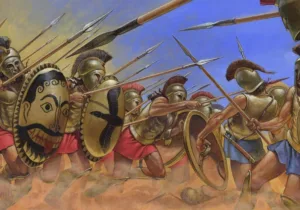The study of C. S. Lewis’s interpretations of history is undergoing something of a revival, though more scholarship remains needed. As K. Alan Snyder and Jamin Metcalf have demonstrated in Many Times and Many Places: C. S. Lewis and the Value of History (2023), Lewis had a strong historical sensibility that undergirded his work.
His little-known article on “Historicism” is featured in C. T. McIntire’s Anthology of Modern Christian Views of History (1977), which testifies to the renewal of interest in history amidst the “age of catastrophe” of two world wars and the threat of nuclear Armageddon.
This led Mark Tooley to situate Lewis’s work alongside the work of Herbert Butterfield on “God in History” which likewise features in McIntire’s collection. In his Providence article, “C.S. Lewis Was Wrong on History” on June 7, 2022, Tooley tells us emphatically that Butterfield was right where Lewis was “Wrong.”
Butterfield was almost an exact contemporary of Lewis. An historian-cum-philosopher of history, he was Master of Peterhouse, Cambridge from 1955 when Lewis was the University’s Professor of Medieval and Renaissance English. Possibly, they met.
We are told that “C. S. Lewis Was Wrong on History” insofar as he rejected any kind of philosophical scheme through which to make sense of past, present, and future, which Lewis derided as Historicism. His point was that we do not have enough data to begin to understand the course of human history, not just in our own lifetimes but across the broadest spans of time.
Butterfield, on the other hand, had what Tooley calls a “more robust confidence” in seeing “God in History.” He identified “two alternative views about life or about history… “Either you trace everything back in the long run to sheer blind Chance, or you trace everything back to God.” Butterfield said that we ought to pick the latter.
Tooley goes on to say that “presumably C. S. Lewis, if he read Butterfield, thought his stress on discerning God’s judgment and Promise in history presumptuous nonsense.”
The problem with Tooley’s take is that Lewis’s views on history are more nuanced and aligned with Butterfield’s than Tooley allows for. Rather than focus on any superficial differences between their respective views on history, it is a much more rewarding to focus on the two men’s shared enterprise of moving beyond and reconciling the paradoxes of history to understand deeper forces at work in the human story.
Butterfield suggested that the historian ought to be a “reconciler” of competing historical narratives while Lewis encouraged the historian to enter “the experience of men long dead.” Lewis wrote that “we must clean the lens and remove the stain so that the real past can be seen better,” or that history is about understanding individual figures on their own terms as opposed to sussing out grand narratives.
When comparing Lewis to Butterfield, the task of harmonizing their purportedly divergent views is rather straightforward. Lewis wrote Butterfield on November 29, 1949, not one year before he wrote “Historicism”, to thank Butterfield for sending a copy of Butterfield’s lectures on Christianity and History which Lewis had read.
Like Lewis, who spoke on Mere Christianity from 1941 through 1944, Butterfield had been invited to broadcast talks on the radio in 1948. Writing to Butterfield, Lewis said “I am not enough of a historian for my praise to be of any value on that side.” However, he added, “It is almost the other way [a]round: I so loathe the Historicism which has been endemic ever since Hegel […] that you v. little roused my darkest suspicions and my delight at what you were really saying was proportionately great.” In other words, Lewis loved Butterfield’s philosophy of history in equal measure to his hatred for the Historicist school of thought; no small thing.
Lewis emphasized page 66 of Butterfield’s book, which he referred to as “a charter granted by a real historian”; that is, one untainted by that Historicism which he otherwise associated with the whole historical profession, at least since Hegel. His annotated copy of Butterfield’s text witnesses to the fact. He drew a line next to this passage:
…the purpose of life is not in the far future, nor, as we so often imagine, around the next corner, but the whole of it is here and now, as fully as ever it will be on this planet. It is always a ‘Now’ that is in direct relation to eternity – not a far future; always immediate experience of life that matters in the last resort – not historical constructions based on abridged text-books or imagined visions of some prosperity that is going to be the heir of all the ages.
Lewis clearly had this passage in mind when he wrote that we do have access to the “total content of time” in the “here and now”: “real or primary history”, which is “the pure, unedited, unexpurgated text straight from the Author’s hand.” It was, for him, “a charter granted by a real historian” because the Historicists, masquerading as historians, had imported Developmentalism from biology to suggest that they could understand history without respect for the human personality as a force that can never be fully understood. Lewis agreed with Butterfield that the historicist revolution posed a massive challenge to the Christian faith and by extension Western civilization.
The solution, for Lewis and for Butterfield was to reinstate a providential view of history centered on the Fall and the Incarnation, a view well received in an age marked by the many catastrophes that, by mid-century, had shattered much belief in progressive Hegelian history. For instance, Lewis stressed in his talk on “What Christians Believe” during the Second World War that God is “the key to history”. “Now,” he went on, “today, this moment, is our chance to choose the right side”: God, not sheer blind chance or dialectical materialism. Butterfield, moreover, stressed in 1948 that if nuclear wipeout were to come, “It will only put an end to a globe which we always knew was doomed to be bad in any case.” This from page 66 of his book, and again Lewis approved. He put it similarly in his article “On Living in Atomic Age.” Both felt that the collapse of optimism experienced from even before the First World War provided an opportunity for authentic Christian views on history to be revived.
This means that Tooley is wrong to set Butterfield up as a providential historian with whom Lewis would have obviously disagreed. Charles Moorman, another medievalist, in 1966 identified Lewis as a scholar who had a clear approach to the past which is “purposive and providential” so far as at times of crisis we are given the opportunity to draw closer to God.
While Lewis was skeptical of all philosophy of history, that is because such theories inevitably begin from rigid ideological precepts. Butterfield invites us to move from thinking about technical history or, in science, evolution (“life”) to thinking about God. If everything is ultimately attributed to God, then science and history must be read in a certain way. However, this doesn’t necessarily lead to Lewis’s much-hated Historicism, which is the temptation to draw from the past non-historical conclusions. Lewis defines Historicism as the belief that men can, by the use of their natural powers, discover an inner meaning in the historical process. Yet, Lewis’s view of Historicism does not preclude technical interpretation of events from the outside looking in. Nor does it preclude reliance on the super-natural to try to get inside the past; to do so is the mark of the “real historian.”
Neither Lewis nor Butterfield thought it was appropriate to take sides in history. Nor should we. To do so is to think ourselves like God, with the robust confidence of the historicists; to assume we have found the inner pattern of history, using our natural powers, in which our ideology is always vindicated. We always win. Other historical characters are consigned to the historical trash. They are not accorded the respect which as human personalities they deserve. And this is pertinent in a world interested in toppling statues.
All of which is to say, we should consider that C. S. Lewis was a bedfellow of Butterfield’s and that on history, Butterfield was right. Much, much more should be made of that today.






 Sponsor a student for Christianity & National Security 2024
Sponsor a student for Christianity & National Security 2024